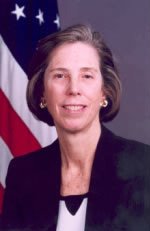
Red the full text of Ambassador Oliver's statement to the Executive Board of UNESCO on October 6, 2006.
Excerpts:
I assume that we all agree that our work must be guided by the democratic principles upon which UNESCO was founded 60 years ago: universality, diversity, justice, dignity, tolerance, respect for human rights and the rule of law—all essential ingredients for world peace.
I hope that we also agree that our work should be guided by the World Summit Outcome Document so that we do not duplicate work being done by other UN organizations.
As we look at the six overarching objectives proposed for the Medium Term Strategy, we see that “championing education for all” is at the top of the list. This is as it should be, for education is the top priority for all of us. Education plays a fundamental role in economic development, in the prevention of disease, and in promoting democracy and human dignity. Because UNESCO is the lead agency within the UN system for education, it is our duty and responsibility to help countries provide quality education to their citizens.
Regarding education, we would like to see an emphasis on five strategic program areas: literacy; civic education; teacher training; health education, especially HIV-AIDS; and higher education. We would also like to see an emphasis on gender parity.......
UNESCO has much to contribute in the area of culture. Given UNESCO’s commitment to cultural diversity, the United States urges UNESCO to promote genuine cultural diversity through programs that foster a free and open exchange of cultural expressions and products across the globe. Any program or policy that uses UNESCO’s name to hinder cultural exchange would run counter to the vision of the founders of this organization and counter to its intended mandate.
No UNESCO cultural program is more identified with UNESCO than the World Heritage program. The United States hopes that the somewhat overdue management audit of the World Heritage Center will be completed in time to inform the Medium Term Strategy.
I find it curious that the last of the overarching objectives in the draft Medium Term Strategy is “fostering mutual understanding, reconciliation and peace.” This is truly an intersectoral objective that lies at the heart of UNESCO’s work. This is a pre-eminent reason why UNESCO was established. This is why we still look to UNESCO to propose ideas to address the hatred, misunderstandings, and conflicts that still plague us sixty years after the Organization’s founding. This is an area where UNESCO’s role as a kind of UN “think tank” needs to be brought fully to bear......
As far as the budget is concerned, the comparative budget document distributed by the Secretariat shows that, thanks to the return of the United States, UNESCO’s budget rose from $544.4 million for the 2002-2003 biennium to $610 million for the 2004-2005 biennium. This large increase should be kept in mind as we discuss issues relating to the budget.